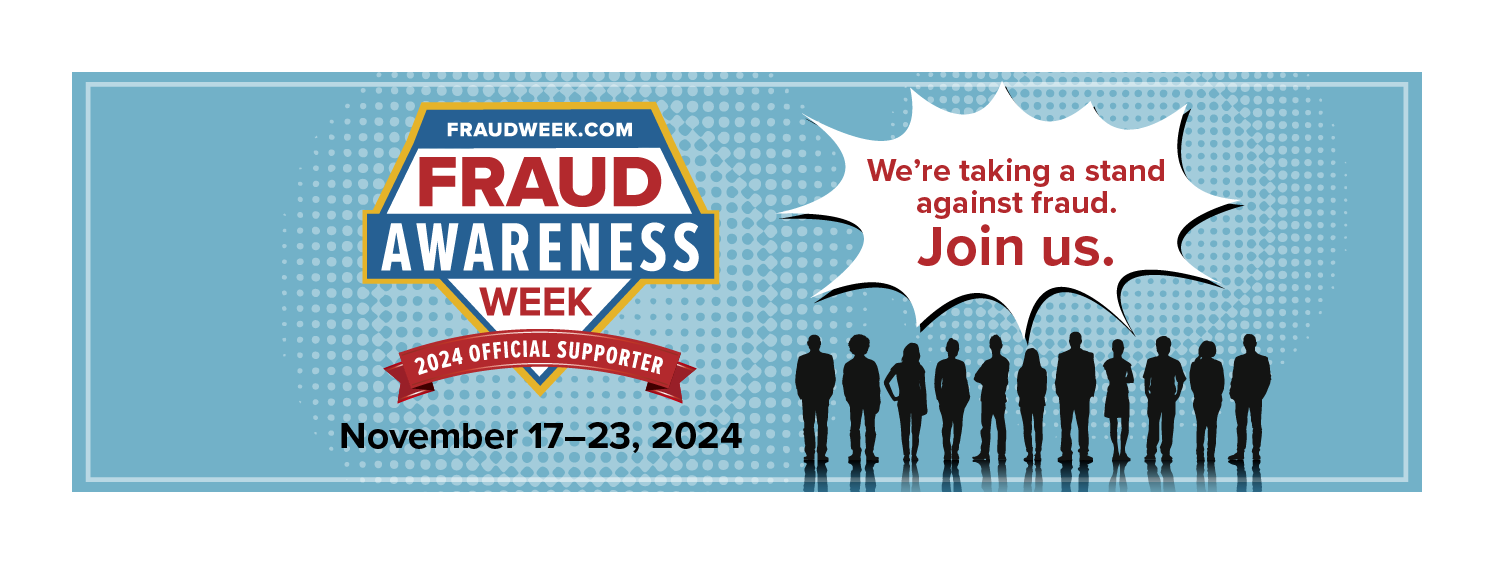Fraud is a constant threat in today's fast-paced, interconnected world. Each year, individuals and organizations are hit with schemes that can cause devastating financial loss. International Fraud Awareness Week, spearheaded by the Association of Certified Fraud Examiners (ACFE), provides an opportunity to bring fraud prevention to the forefront and equip people with the knowledge to defend against these threats.
As a committed partner of ACFE, HTLF takes this opportunity to raise awareness, share insights, and provide resources to help protect against fraud.
What is ACFE?
The Association of Certified Fraud Examiners (ACFE) is the world's largest anti-fraud organization, providing leadership in the fight against all forms of fraud, from corporate fraud to identity theft. ACFE's comprehensive research and education resources are relied upon by organizations worldwide, including HTLF, to stay ahead of evolving fraud tactics.
Many members of HTLF's fraud prevention team are Certified Fraud Examiners (CFEs), credentialed by ACFE. As CFEs, they stay on top of emerging trends and continuously integrate ACFE's cutting-edge research into HTLF's anti-fraud strategies. This collaboration strengthens our ability to protect clients from the ever-evolving world of fraud.
The Importance of ACFE International Fraud Awareness Week
International Fraud Awareness Week, organized by ACFE, is an annual campaign aimed at educating individuals and organizations on how to detect and prevent fraud. It serves as a critical reminder that fraud is not just a minor inconvenience—it's a global issue with significant financial repercussions that can affect every aspect of life.
According to ACFE's Occupational Fraud 2024: A Report to the Nations, organizations lose an estimated 5% of their annual revenue to fraud. However, the impact of fraud stretches far beyond corporate losses. Consumer fraud, tax fraud, and identity theft are also widespread, often affecting individuals in subtle yet damaging ways. These schemes can lead to significant financial hardships, disrupt lives, and erode trust in financial systems.
Fraud has the potential to cripple both individuals and organizations, which makes education and prevention efforts crucial. That's where ACFE comes in. Their extensive resources—especially those highlighted during International Fraud Awareness Week—are invaluable tools for combating fraud on all fronts. Whether it's learning how to identify common scams or implementing stronger preventive measures, these resources empower individuals and organizations to better protect themselves and their assets.
Trends in Fraud: What HTLF Sees Most Often
At HTLF, we've identified several recurring fraud trends that affect both consumers and organizations. Understanding these patterns can be the first step in protecting yourself from being a victim.
Social Engineering
Social engineering is a tactic where fraudsters manipulate individuals into divulging confidential information. Through methods like phishing emails, fraudulent calls, and fake websites, scammers use psychological tricks to gain trust and access personal data.
Common schemes include phishing emails that impersonate trusted entities or fraudulent calls designed to steal sensitive information. HTLF has developed several resources to help our customers recognize and combat social engineering tactics. Check out our blog post, Digital Deceptions: How to Protect Yourself from Social Engineering, for a closer look.
Imposter Scams
Imposter scams are on the rise, where fraudsters pretend to be someone you know or trust, such as a government official or tech support representative. According to the Federal Trade Commission's 2023 report, imposter scams were one of the most common types of fraud. Fraudsters may request sensitive data or even payments under false pretenses.
Elder Abuse and Exploitation
Elder financial abuse is a particularly concerning trend, where scammers target seniors for financial gain. Fraudsters prey on their trust and may manipulate them into making large withdrawals or questionable financial decisions. Warning signs include sudden and large withdrawals, unusual purchases, and new "friends" asking for money. If you suspect elder abuse or want to understand the signs, visit HTLF's guide, Look Out for These Signs of Financial Abuse.
The Cost of Fraud
The financial toll of fraud is staggering. According to ACFE's Occupational Fraud 2024 report, organizations lose an estimated 5% of their annual revenue to fraud. For individuals, the numbers may even be more troubling: Federal Trade Commission data indicates consumers reported losing more than $10 billion to fraud in 2023. This can result to devastating financial hardship, leading to long-term consequences like damaged credit, identity theft, and loss of savings.
To effectively combat fraud, both individuals and organizations need to be proactive and informed. Implementing robust fraud prevention strategies isn't just a precaution—it's a necessity. Regularly reviewing internal controls, conducting fraud risk assessments, and training employees on fraud detection can significantly reduce exposure to fraudulent activities.
ACFE offers several actionable resources to help you take concrete steps toward fraud prevention. Their tools, such as industry-specific guides and best practices for detecting fraud early, can help you safeguard your finances. Visit ACFE's website to explore its comprehensive resources and begin implementing strategies that protect your organization or personal finances from potential fraud. Don't wait until it's too late—taking these steps now can save you from costly consequences later.
Stay Informed and Vigilant
ACFE International Fraud Awareness Week is a powerful reminder of the importance of fraud prevention in our daily lives. Fraud may be evolving, but through education, vigilance, and the right preventative measures, individuals and organizations can protect themselves.
At HTLF, we are committed to safeguarding our clients by providing expert guidance and staying at the forefront of fraud research. HTLF regularly publishes content to help our customers stay ahead of fraud trends, such as our latest resources on AI and Fraud.
Join us in recognizing International Fraud Awareness Week and take the necessary steps to defend against fraud. For more information and resources, visit ACFE International Fraud Week Resources.
For additional information on other fraud protection topics, visit our Fraud Protection Resource page on our website.









